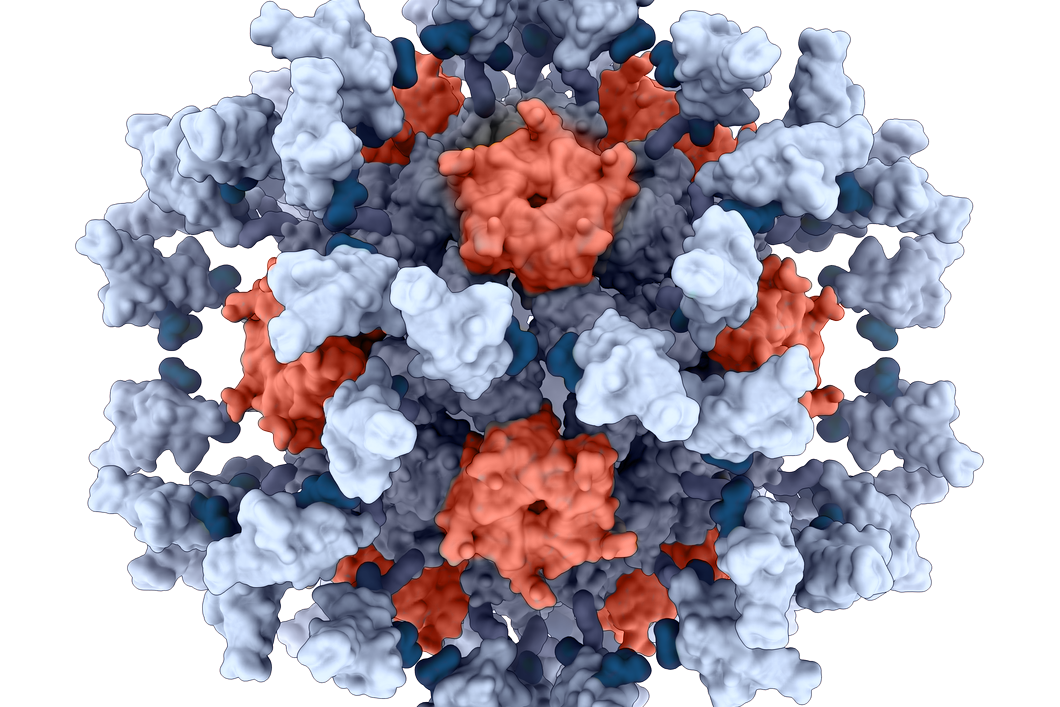
Icosavax has drawn up clinical trial plans for its new type of vaccine in a strategy to commence tests of multiple programs, including a Covid-19 candidate. But really, the startup is following a path blazed by Mother Nature.
The Seattle-based biotech is developing vaccines based on virus-like particles (VLPs), proteins that resemble viruses. Naturally occurring VLPs are already the basis of commercially available vaccines for human papillomavirus and hepatitis B, among other viruses. Those vaccines have been shown to work well in older adults and they spark immunity that’s durable, said Icosavax CEO Adam Simpson. Vaccines from naturally occurring VLPs have also shown that they can be combined, so a single shot can offer immunity to multiple pathogens. Icosavax aims to offer all of those features with its VLP-vaccines.
Icosavax now has $100 million to support its clinical research plans. The investment, a Series B round of financing, was led by RA Capital Management.
VLPs contain no genetic material so they can’t replicate, making them safer than vaccines based on a weakened virus, Simpson said. While vaccines based on naturally occurring VLPs have worked well, these particles have had less success when the pathogens they address are more complex. So Icosavax is picking up where Mother Nature left off.
Rather than working with VLPs that nature provides, Icosavax engineers its own. Computers design the particles, which the company makes into vaccines that display a more complex array of viral antigens than is possible with naturally occurring VLPs. Icosavax’s VLP technology was licensed from the University of Washington’s Institute for Protein Design. Simpson said his company’s approach could address pathogens that have eluded vaccine developers.

The Power of One: Redefining Healthcare with an AI-Driven Unified Platform
In a landscape where complexity has long been the norm, the power of one lies not just in unification, but in intelligence and automation.
“We’re talking about targets on the viral side that have no vaccines at all,” Simpson said. “That’s the primary focus.”
When Icosavax launched in 2019, its initial focus was developing a vaccine for respiratory syncytial virus (RSV). The virus affects an estimated 64 million people globally each year, causing about 160,000 deaths, according to the National Institute of Allergy and Infectious Diseases (NIAID). Icosavax licensed an RSV antigen developed by that agency and combined it with a VLP it engineered, forming the company’s RSV vaccine candidate, IVX-121.
Icosavax has since expanded its scope to include human metapneumovirus (hMPV), another respiratory virus. The company’s first clinical trial will test the RSV vaccine candidate, IVX-121. Data from that study in young and older adults are expected to support transitioning the study to a test of a bivalent vaccine for both RSV and hMPV.
Last October, Icosavax turned its VLP technology to the development of a SARS-CoV-2 vaccine. That vaccine candidate, IVX-411, is made with a VLP that displays the receptor binding domain of the novel coronavirus. The research is supported by a $10 million grant from the Bill & Melinda Gates Foundation. In preclinical research, the vaccine produced robust levels of neutralizing antibodies and offered protection from the virus. Results were published in the scientific journal Cell.
The biopharmaceutical industry has produced several Covid vaccines that have been authorized for emergency use, and more vaccines are in development. But Simpson contends that there’s still a place for Icosavax’s shot. In addition to eliciting high levels of antibodies in older adults, research suggests that VLP vaccines offer a breadth of response that could apply to new variants. He added that the developing world needs a vaccine that offers scalable manufacturing and does not come with the ultra-cold storage requirements of messenger RNA vaccines.
The clinical research testing a bivalent RSV/hMPV vaccine could pave the way for combinations that include the Icosavax Covid vaccine, Simpson said. And that research may lead to a place for Icosavax’s vaccine in industrialized nations.
“We’re actively thinking about how to enter the developed world, and a combination approach is certainly one of the thoughts,” Simpson said. “We think a protein-based vaccine like this would be the ideal booster vaccine after folks have had their first wave of vaccination.”
Icosavax isn’t the only company developing VLP-based vaccines. The pipeline of Quebec City, Canada-based Medicago includes a Covid vaccine candidate currently in a Phase 3 clinical trial. Novavax is another VLP vaccine developer. The Gaithersburg, Maryland company’s Covid vaccine candidate is also in late-stage testing. Simpson said Icosavax will begin clinical testing of its VLP vaccine candidates later this year, though he declined to be more specific about the timing.
With the new funding, Peter Kolchinsky, founder and managing partner of RA Capital, is joining the Icosavax board of directors. Other participants in the company’s latest financing included Janus Henderson Investors, Perceptive Advisors, Viking Global Investors, Cormorant Asset Management, Omega Funds, and Surveyor Capital, as well as earlier investors Qiming Venture Partners USA, Adams Street Partners, Sanofi Ventures, and ND Capital. The Series B financing total includes $6.5 million from Open Philanthropy that was announced last October.








